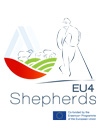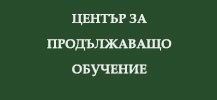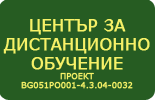Institutional economics
|
Course title: |
Institutional economics |
|
|
Course code: |
IFINE |
|
|
ECTS: |
5 |
|
|
In-class hours |
Lectures: |
30 |
|
Laboratory work/Tutorials: |
30 |
|
|
Self-preparation hours |
Practical training: |
20 |
|
Other: |
20 |
|
|
Total hours: |
100 |
|
|
Language: |
English |
|
|
Study cycle: |
BSc, Master |
|
|
Semester: |
Winter, summer |
|
|
Faculty: |
Faculty of Economics |
|
|
Name of the lecturer(s): |
Assos. Prof. Minko Georgiev, PhD |
|
|
Mode of delivery: |
Face-to-face, distance learning |
|
|
Prerequisites: |
No prerequisites |
|
|
Learning outcomes of the course unit: |
The mission of the undergraduate program in Institutional Economics is to acquaint students with the economic aspects of modern society, to familiarize them with techniques for the analysis of contemporary economic problems, and to develop in them an ability to exercise judgment in evaluating public policy. The course "Institutional Economics" (IE) is a part of the curriculum of most Bulgarian universities, which teach public studies. In the Agricultural University - Plovdiv, students study IE in various forms in the programs of bachelor’s and master’s courses. The purpose of this discipline is to train students in the specifics of: (1) Theory of New Institutional Economics (NIE), (2) Institutional Impact Approach - Structure of Institution for EU and Bulgaria, (3) Transaction Costs Economics (TCE) - Procedures, Contract mechanisms, Organizational Calculus for EU and Bulgaria; (4) Agriculture and NIE (this part is optional). The themes of the course are divided into five main parts: (1) History of Economics; (2) The theory of: Institutions; Property rights; Public choice; Principal-agent theory; Contract Theory; Theory of Institutional Change, etc. (3) Behavioural approach in the analysis; (4) Methodological exercises – contemporary analysis and policy scenarios (5) Methodological exercises – Competitive Institutional Analyses (6) Methodological exercises – TCE / discreet structural analysis and organizational calculus/.
The main part of the educational material on the subject "NIE" is taught through lectures and exercises. In the process of teaching videos, Internet, etc. are used. Lectures are held with all students. Students are prepared for each lecture on a predetermined plan by the professor. In preparation, they recommend using specific topic literature and documents. Monitoring shall be conducted during lectures through verbal questions to each student. The final exam is conducted in the form of a final test. Course description This course provides an inter-disciplinary overview of the history, evolution and current challenges facing the NIE. The Department's purpose is to acquaint students with the economic aspects of modern society, to familiarize them with techniques for the analysis of contemporary economic problems, and to develop in them an ability to exercise judgment in evaluating public policy. There is training for the general student as well as for those who plan careers as economists in civil service, private enterprise, teaching, or research. This course presents a systematic overview of economic, law and organizational influences on agriculture.
Course Objectives Students who have successfully completed the course can find its application at all levels of NIE in European organizations, and the Bulgarian government departments or private entities. The future career direction of students may be related to realization in the political sphere and the development of regulations. |
|
|
Course contents: |
Contents of the program: Topic 1. Introduction to institutional economics. Economical History. The classical theory of economics and evolution of rules and society. Topic 2. New Institutional Economics (NIE) - hybrid conception. Law, economics and organizations. Approach 1: Institutional impact; Approach 2: Theory of Transaction Costs (TTC). Behavioral focus. Topic 3. Institutions. Informal institutions. Formal institutions. Topic 4. Market exchange. Economic organization and theoretical dualism. Topic 5. Market exchange and contract framework. Principal-agent model. Contractual choose theory. Topics 6. Non-Market exchange. State and government. Political and economics point of view. Public choose theory. Problems of: “free raider”, “rent-seeking”, “externalities”, “bureaucracy” and ect. Topic 7. Property rights theory. Evolution of rights concepts. Law, social and economic aspects of property rights. Topic 8. Property rights and common-pool recourses. The problem of externality. Topics 9. Property rights, torts and restitution. Firm and property rights. Topic 10. Theory of transactions costs. Property rights and transaction costs. Topic 11. Opportunistic behavior and transaction costs. Governance structure. Topic 12. Firms in NIE context. Topic 13. Theories of Institutional change. Transaction costs and economic growth. Topic 14. Contemporary analyses-practical focus. Topic 15. Assets specificity analyses. Analyses of transactions - Technical transformations and organizational efficiency. Topic 16. Discreet-structural analyses. Organizational calculations - measuring of transaction costs. Topic 17. “3D” analyses of property rights. Positive approach. Topic 18. Cognitive analysis in NIE framework. The practical focus of the bargaining. Topic 19. Competitive analyses of the institutional alternatives. Benefit – costs analyses. Topic 20. Policy scenarios. How to do rules? Sophistical approach; Technical approach. |
|
|
Recommended or required reading: |
1. Buchanan, James M., and Gordon Tullock. (1985) The Calculus of Consent. Indianapolis, IN: Liberty Fund, Inc. 1962. 2. Buchanan (1999), Cost and Choice: An Inquiry in Economic Theory, Collected Works of James M. Buchanan, Vol. 6 Publisher Indianapolis, IN: Liberty Fund, Inc. (1969) 3. Cheung, Steven (1968). "Private property rights and sharecropping". Journal of Political Economy. 76 (6): 107–122. doi:10.1086/259477. JSTOR 1830153. 4. Cheung, Steven N.S. (2016). "Steven N.S. Cheung's Reminiscence of Himself - A Reply to Ning Wang". Man and the Economy. 3 (1): 1–21. 5. Coase, Ronald, "The problem of social cost", Journal of Law and Economics, 1960. 6. Elinor Ostrom (2005). "Doing Institutional Analysis: Digging Deeper than Markets and Hierarchies," Handbook of New Institutional Economics, C. Ménard and M. Shirley, eds. Handbook of New Institutional Economics, pp. 819-848. Springer. 7. Gwartney, James D., and Richard L. Stroup (1992). Economics: Private and Public Choice, 6th ed. Especially chaps. 4, 30. 1992. 8. Harold Demsetz (1967). "Toward a Theory of Property Rights," American Economic Review, 57(2), pp. 347-359. 9. Hart, Oliver, (1995), Firms, Contracts, and Financial Structure. Oxford University Press, ISBN 0-19-828881-6. 10. Jensen, Michael C.; Meckling, William H. (1976). "Theory of the Firm: Managerial Behavior, Agency Costs and Ownership Structure". Journal of Financial Economics. 3 (4): 305–360. doi:10.1016/0304-405x(76)90026-x. SSRN 94043 Freely accessible. 11. North, Douglass C. "Transaction Costs, institutions, and Economic Performance." International Center for Economic Growth (n.d.): n. pag. Khousachonine.ucoz.com. Web. 12. North, Douglass C., "Institutions, institutional change and economic performance", Cambridge University Press, 1990 13. North, Douglass C., "Structure and change in economic history", New York, 1981 14. Ostrom Elinor, Vincent Ostrom (2004). The Quest for Meaning in Public Choice.The American Journal of Economics and Sociology. Volume 63, Issue 1. 15. Simon H., Administrative behavior, A Study of Decision Making Processes in Organizations 1961 16. Tullock. The Welfare Costs of Tariffs, Monopolies, and Theft. // Western Economic Journal 5 (3). 1967. с. 224 – 232. 17. Whyte, G. "The Role of Asset Specificity in the Vertical Integration Decision", Journal of Economic Behavior and Organization (23:3), May 1994, pp. 287–302. 18. Williamson, Oliver (2000). "The 'New Institutional Economics: Taking Stock, Looking Ahead". Journal of Economic Literature. 19. Williamson, Oliver E (2002). "The Theory of the Firm as Governance Structure: From Choice to Contract". Journal of Economic Perspectives. 16 (3): 171–195. doi:10.1257/089533002760278776. ISSN 0895-3309. 20. Williamson, Oliver E.(1999), and Scott E. Masten, eds., "The economics of transaction costs", Edward Elgar Publishing, 1999 21. Yeager, Timothy J.(1999), "Institutions, transition economies, and economic development", Westview Press, 1999. |
|
|
Planned learning activities and teaching methods: |
Monological explanation (lecture, presentation) Dialogue methods(tutorials, conversation,discussion,brainstorming) |
|
|
Assessment methods and criteria: |
Written test |
|
 - Events on the occasion of the 80th anniversary of AU
- Events on the occasion of the 80th anniversary of AU











